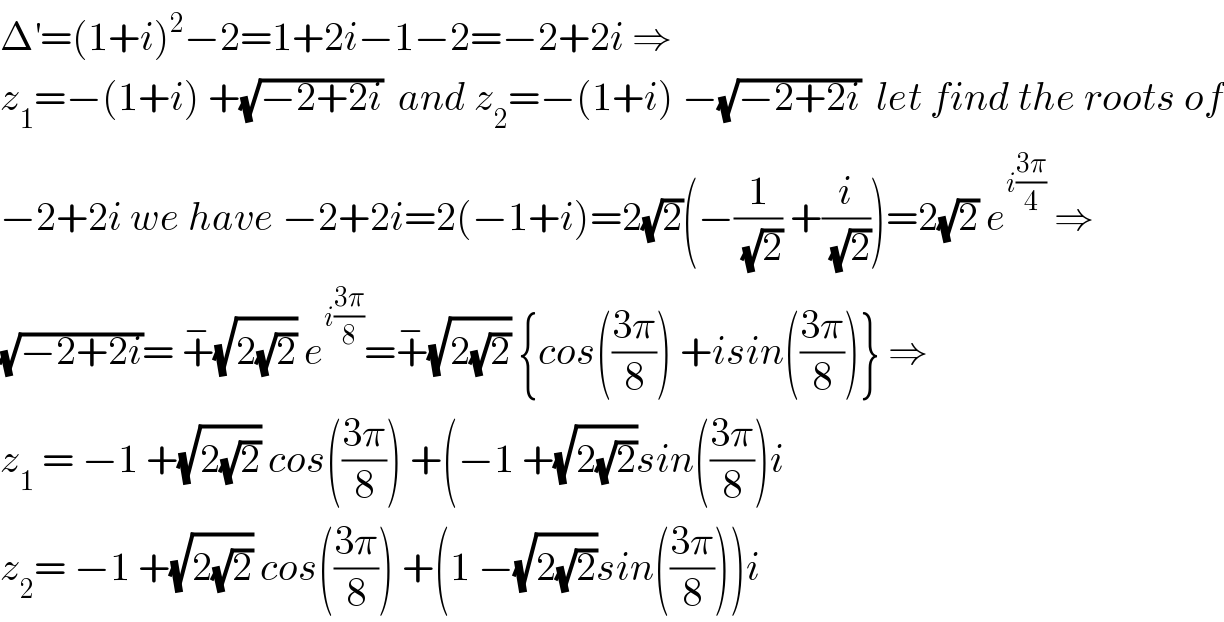
Question Number 38395 by NECx last updated on 25/Jun/18

$${Find}\:{roots}\:{of}\:{the}\:{equation} \\ $$$${z}^{\mathrm{2}} +\mathrm{2}\left(\mathrm{1}+{i}\right){z}\:+\mathrm{2}=\mathrm{0} \\ $$$${leaving}\:{your}\:{answer}\:{in}\:{a}+{ib} \\ $$
Commented by maxmathsup by imad last updated on 25/Jun/18

$$\Delta^{'} =\left(\mathrm{1}+{i}\right)^{\mathrm{2}} −\mathrm{2}=\mathrm{1}+\mathrm{2}{i}−\mathrm{1}−\mathrm{2}=−\mathrm{2}+\mathrm{2}{i}\:\Rightarrow \\ $$$${z}_{\mathrm{1}} =−\left(\mathrm{1}+{i}\right)\:+\sqrt{−\mathrm{2}+\mathrm{2}{i}}\:\:{and}\:{z}_{\mathrm{2}} =−\left(\mathrm{1}+{i}\right)\:−\sqrt{−\mathrm{2}+\mathrm{2}{i}}\:\:{let}\:{find}\:{the}\:{roots}\:{of} \\ $$$$−\mathrm{2}+\mathrm{2}{i}\:{we}\:{have}\:−\mathrm{2}+\mathrm{2}{i}=\mathrm{2}\left(−\mathrm{1}+{i}\right)=\mathrm{2}\sqrt{\mathrm{2}}\left(−\frac{\mathrm{1}}{\sqrt{\mathrm{2}}}\:+\frac{{i}}{\sqrt{\mathrm{2}}}\right)=\mathrm{2}\sqrt{\mathrm{2}}\:{e}^{{i}\frac{\mathrm{3}\pi}{\mathrm{4}}} \:\Rightarrow \\ $$$$\sqrt{−\mathrm{2}+\mathrm{2}{i}}=\:\overset{−} {+}\sqrt{\mathrm{2}\sqrt{\mathrm{2}}}\:{e}^{{i}\frac{\mathrm{3}\pi}{\mathrm{8}}} =\overset{−} {+}\sqrt{\mathrm{2}\sqrt{\mathrm{2}}}\:\left\{{cos}\left(\frac{\mathrm{3}\pi}{\mathrm{8}}\right)\:+{isin}\left(\frac{\mathrm{3}\pi}{\mathrm{8}}\right)\right\}\:\Rightarrow \\ $$$${z}_{\mathrm{1}} \:=\:−\mathrm{1}\:+\sqrt{\mathrm{2}\sqrt{\mathrm{2}}}\:{cos}\left(\frac{\mathrm{3}\pi}{\mathrm{8}}\right)\:+\left(−\mathrm{1}\:+\sqrt{\mathrm{2}\sqrt{\mathrm{2}}}{sin}\left(\frac{\mathrm{3}\pi}{\mathrm{8}}\right){i}\right. \\ $$$${z}_{\mathrm{2}} =\:−\mathrm{1}\:+\sqrt{\mathrm{2}\sqrt{\mathrm{2}}}\:{cos}\left(\frac{\mathrm{3}\pi}{\mathrm{8}}\right)\:+\left(\mathrm{1}\:−\sqrt{\mathrm{2}\sqrt{\mathrm{2}}}{sin}\left(\frac{\mathrm{3}\pi}{\mathrm{8}}\right)\right){i} \\ $$
Answered by ajfour last updated on 25/Jun/18
![let z=x+iy ⇒ x^2 −y^2 +2ixy+2(1+i)(x+iy)+2=0 x^2 −y^2 +2ixy+2x+2iy+2ix−2y+2=0 _________________________ ⇒ x^2 −y^2 +2x−2y+2=0 and xy+x+y=0 _________________________ ⇒ y= −(x/(1+x)) x^2 −(x^2 /((1+x)^2 ))+2x+((2x)/(1+x))+2=0 x^2 (1+x)^2 −x^2 +2(1+x)^3 +2x(1+x)=0 x^4 +2x^3 +x^2 −x^2 +2+2x^3 +6x^2 +6x +2x+2x^2 =0 x^4 +4x^3 +8x^2 +8x+2=0 (x^4 +4x^3 +6x^2 +4x+1)+2x^2 +4x+1=0 (x+1)^4 +2x^2 +4x+1=0 (x+1)^4 +2(x+1)^2 −1=0 [(x+1)^2 +1]^2 =2 (x+1)^2 =−1+(√2) x=−1±(√((√2)−1)) y= −(x/(x+1)) = ((1∓(√((√2)−1)))/(±(√((√2)−1)))) = (1/(±(√((√2)−1))))−1 z = −1 ±(√((√2)−1))+i((1/(±(√((√2)−1))))−1) . Two roots (using either + or − at both the places the same sign).](Q38398.png)
$${let}\:{z}={x}+{iy} \\ $$$$\Rightarrow\:{x}^{\mathrm{2}} −{y}^{\mathrm{2}} +\mathrm{2}{ixy}+\mathrm{2}\left(\mathrm{1}+{i}\right)\left({x}+{iy}\right)+\mathrm{2}=\mathrm{0} \\ $$$${x}^{\mathrm{2}} −{y}^{\mathrm{2}} +\mathrm{2}{ixy}+\mathrm{2}{x}+\mathrm{2}{iy}+\mathrm{2}{ix}−\mathrm{2}{y}+\mathrm{2}=\mathrm{0} \\ $$$$\_\_\_\_\_\_\_\_\_\_\_\_\_\_\_\_\_\_\_\_\_\_\_\_\_ \\ $$$$\Rightarrow\:\:\:\boldsymbol{{x}}^{\mathrm{2}} −\boldsymbol{{y}}^{\mathrm{2}} +\mathrm{2}\boldsymbol{{x}}−\mathrm{2}\boldsymbol{{y}}+\mathrm{2}=\mathrm{0}\:\:{and} \\ $$$$\:\:\:\:\:\:\:\:\:\:\:\:\:\boldsymbol{{xy}}+\boldsymbol{{x}}+\boldsymbol{{y}}=\mathrm{0} \\ $$$$\_\_\_\_\_\_\_\_\_\_\_\_\_\_\_\_\_\_\_\_\_\_\_\_\_ \\ $$$$\Rightarrow\:\:\:\:\:{y}=\:−\frac{{x}}{\mathrm{1}+{x}} \\ $$$${x}^{\mathrm{2}} −\frac{{x}^{\mathrm{2}} }{\left(\mathrm{1}+{x}\right)^{\mathrm{2}} }+\mathrm{2}{x}+\frac{\mathrm{2}{x}}{\mathrm{1}+{x}}+\mathrm{2}=\mathrm{0} \\ $$$${x}^{\mathrm{2}} \left(\mathrm{1}+{x}\right)^{\mathrm{2}} −{x}^{\mathrm{2}} +\mathrm{2}\left(\mathrm{1}+{x}\right)^{\mathrm{3}} +\mathrm{2}{x}\left(\mathrm{1}+{x}\right)=\mathrm{0} \\ $$$${x}^{\mathrm{4}} +\mathrm{2}{x}^{\mathrm{3}} +{x}^{\mathrm{2}} −{x}^{\mathrm{2}} +\mathrm{2}+\mathrm{2}{x}^{\mathrm{3}} +\mathrm{6}{x}^{\mathrm{2}} +\mathrm{6}{x} \\ $$$$\:\:\:\:\:\:\:\:\:\:+\mathrm{2}{x}+\mathrm{2}{x}^{\mathrm{2}} =\mathrm{0} \\ $$$${x}^{\mathrm{4}} +\mathrm{4}{x}^{\mathrm{3}} +\mathrm{8}{x}^{\mathrm{2}} +\mathrm{8}{x}+\mathrm{2}=\mathrm{0} \\ $$$$\left({x}^{\mathrm{4}} +\mathrm{4}{x}^{\mathrm{3}} +\mathrm{6}{x}^{\mathrm{2}} +\mathrm{4}{x}+\mathrm{1}\right)+\mathrm{2}{x}^{\mathrm{2}} +\mathrm{4}{x}+\mathrm{1}=\mathrm{0} \\ $$$$\left({x}+\mathrm{1}\right)^{\mathrm{4}} +\mathrm{2}{x}^{\mathrm{2}} +\mathrm{4}{x}+\mathrm{1}=\mathrm{0} \\ $$$$\left({x}+\mathrm{1}\right)^{\mathrm{4}} +\mathrm{2}\left({x}+\mathrm{1}\right)^{\mathrm{2}} −\mathrm{1}=\mathrm{0} \\ $$$$\left[\left({x}+\mathrm{1}\right)^{\mathrm{2}} +\mathrm{1}\right]^{\mathrm{2}} =\mathrm{2} \\ $$$$\:\:\:\left({x}+\mathrm{1}\right)^{\mathrm{2}} =−\mathrm{1}+\sqrt{\mathrm{2}} \\ $$$$\:\:\:\:\:{x}=−\mathrm{1}\pm\sqrt{\sqrt{\mathrm{2}}−\mathrm{1}} \\ $$$$\:\:{y}=\:−\frac{{x}}{{x}+\mathrm{1}}\:=\:\frac{\mathrm{1}\mp\sqrt{\sqrt{\mathrm{2}}−\mathrm{1}}}{\pm\sqrt{\sqrt{\mathrm{2}}−\mathrm{1}}} \\ $$$$\:\:\:\:\:=\:\frac{\mathrm{1}}{\pm\sqrt{\sqrt{\mathrm{2}}−\mathrm{1}}}−\mathrm{1} \\ $$$$\:\:\boldsymbol{{z}}\:=\:−\mathrm{1}\:\pm\sqrt{\sqrt{\mathrm{2}}−\mathrm{1}}+{i}\left(\frac{\mathrm{1}}{\pm\sqrt{\sqrt{\mathrm{2}}−\mathrm{1}}}−\mathrm{1}\right)\:. \\ $$$$\:\:\:\:{Two}\:{roots}\:\left({using}\:{either}\:+\:{or}\:−\right. \\ $$$$\left.{at}\:{both}\:{the}\:{places}\:{the}\:{same}\:{sign}\right). \\ $$
Commented by MrW3 last updated on 25/Jun/18

$${good}\:{work}! \\ $$$${since}\:\frac{\mathrm{1}}{\sqrt{\sqrt{\mathrm{2}}−\mathrm{1}}}=\sqrt{\sqrt{\mathrm{2}}+\mathrm{1}} \\ $$$$\Rightarrow\boldsymbol{{z}}\:=\:\pm\sqrt{\sqrt{\mathrm{2}}−\mathrm{1}}−\mathrm{1}+{i}\left(\pm\sqrt{\sqrt{\mathrm{2}}+\mathrm{1}}−\mathrm{1}\right) \\ $$
Commented by malwaan last updated on 25/Jun/18

$$\mathrm{to}\:\mathrm{ajfour} \\ $$$$\mathrm{2}{x}\left(\mathrm{1}+{x}\right)^{\mathrm{2}} \overset{?} {=}\mathrm{2}\left(\mathrm{1}+{x}\right)^{\mathrm{3}} \:? \\ $$
Commented by ajfour last updated on 25/Jun/18

$$\left(\mathrm{2}{x}+\mathrm{2}\right)\left(\mathrm{1}+{x}\right)^{\mathrm{2}} =\mathrm{2}\left(\mathrm{1}+{x}\right)^{\mathrm{3}} \:\: \\ $$$${please}\:{try}\:{to}\:{understand}.. \\ $$
Commented by malwaan last updated on 25/Jun/18

$$\mathrm{thank}\:\mathrm{you}\:\mathrm{so}\:\mathrm{much}\:\mathrm{mr}\:\mathrm{ajfour} \\ $$$$\mathrm{your}\:\mathrm{answer}\:\mathrm{is}\:\mathrm{100\%}\:\mathrm{right} \\ $$$$\mathrm{thanks}\:\mathrm{Mrw3} \\ $$
